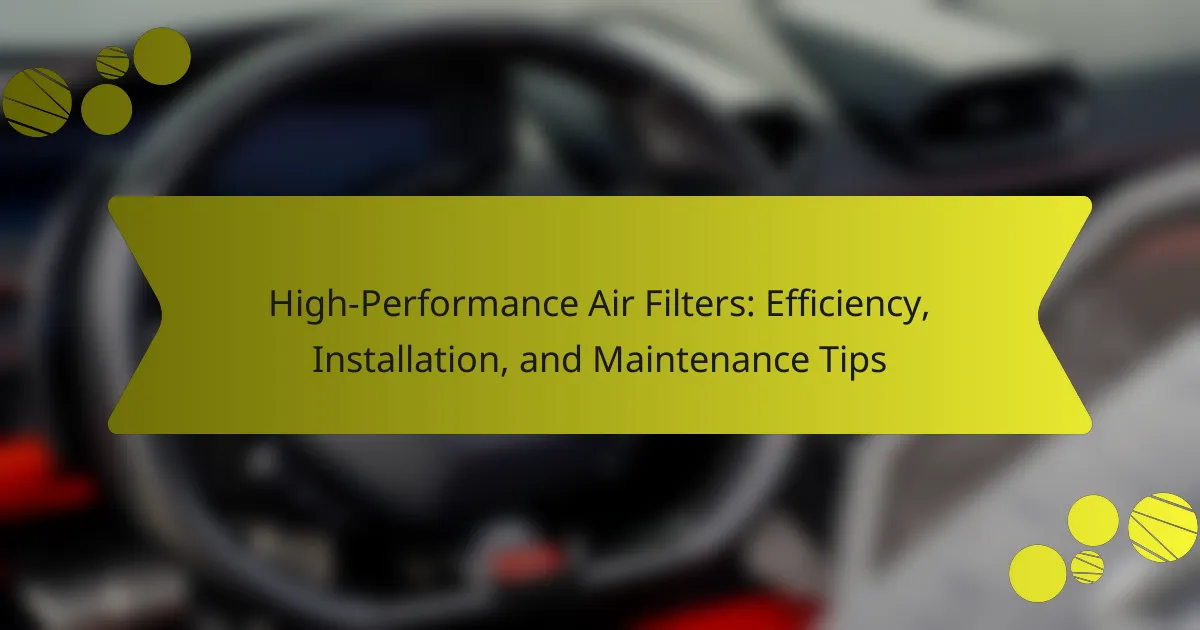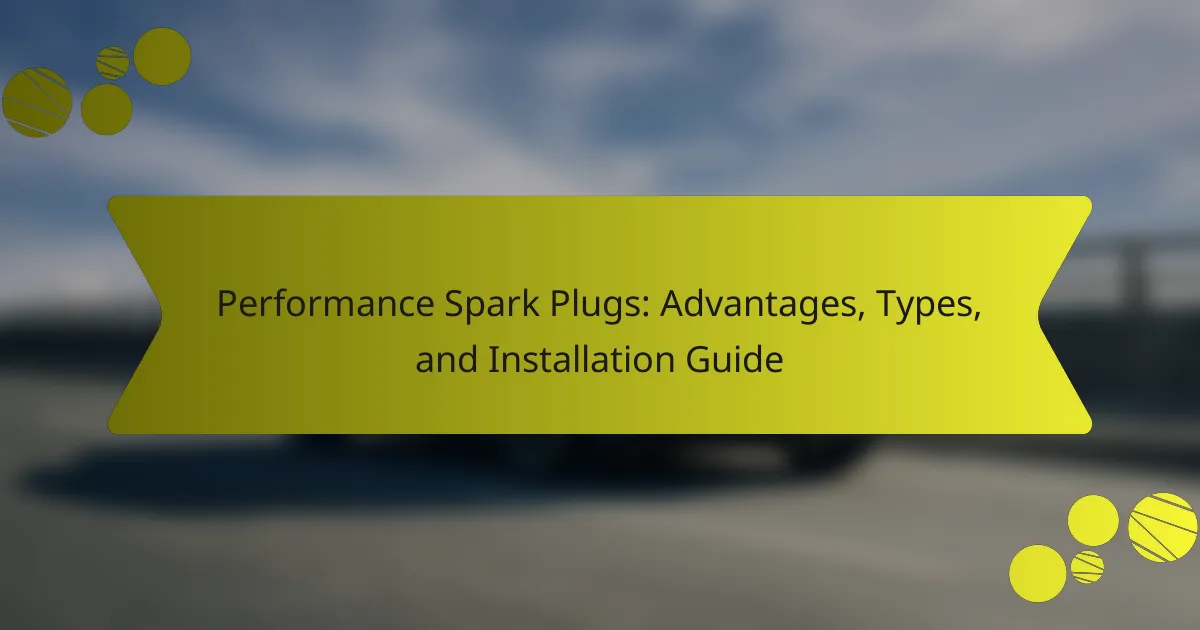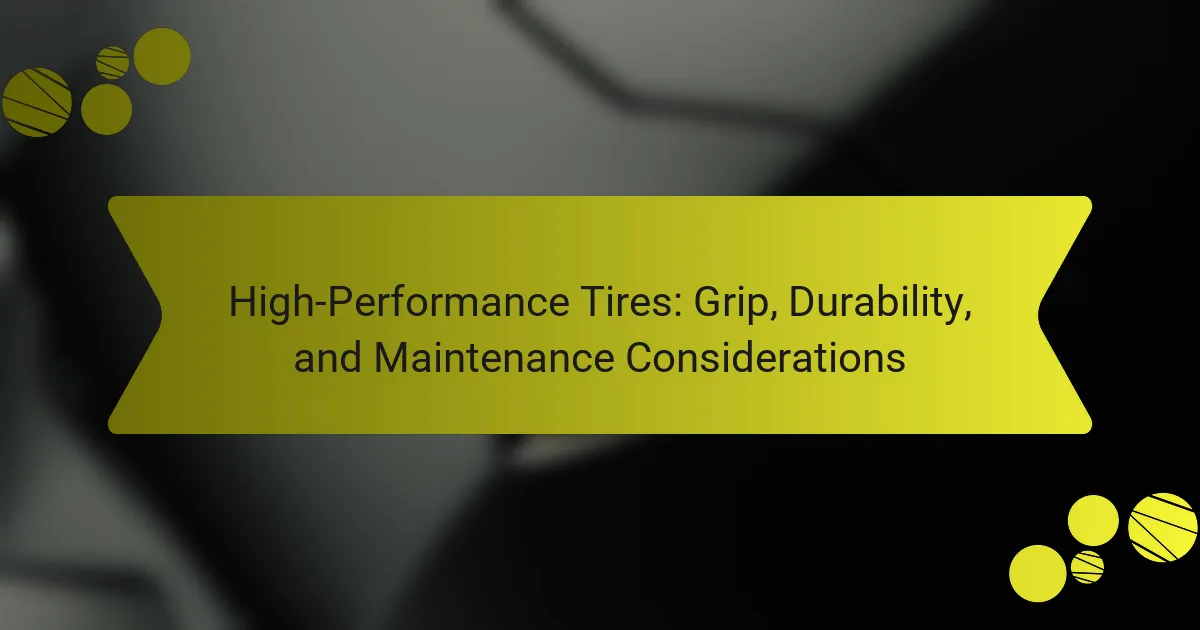High-performance air filters significantly improve indoor air quality by capturing airborne pollutants and allergens. This article covers their efficiency, installation best practices, and maintenance tips to ensure optimal performance. Learn about the impact of filter materials, the importance of regular replacements, and unique features that enhance filtration.
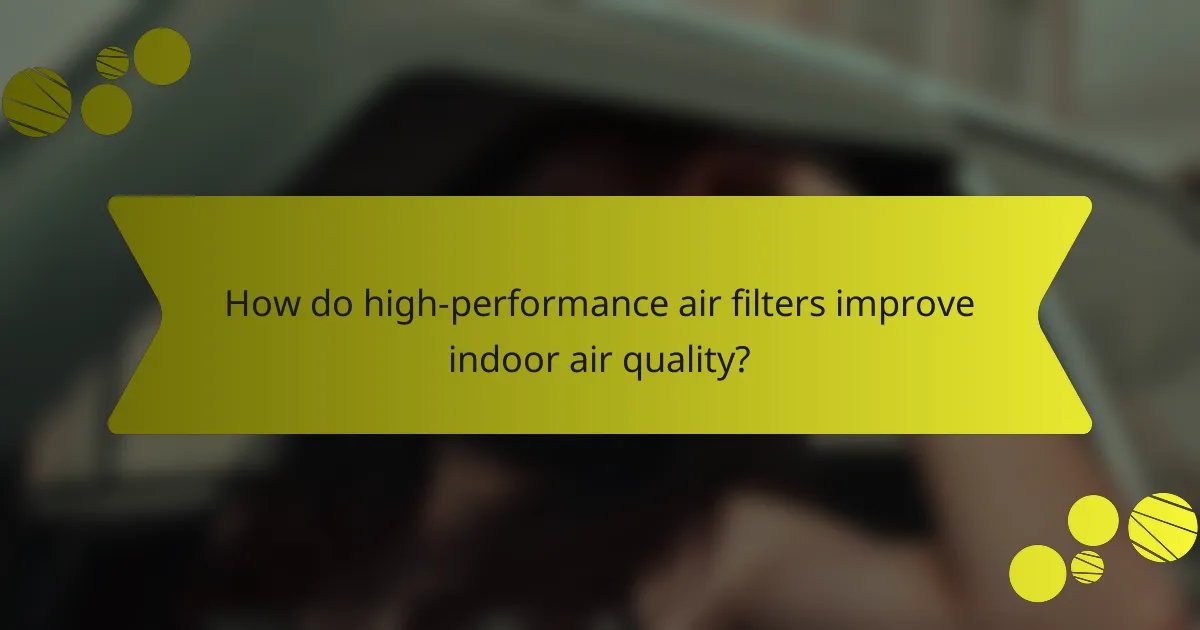
How do high-performance air filters improve indoor air quality?
High-performance air filters significantly enhance indoor air quality by capturing a higher percentage of airborne pollutants. They remove allergens, dust, and harmful particles, leading to cleaner air. Improved filtration efficiency helps reduce respiratory issues and enhances overall health. Regular maintenance ensures optimal performance, prolonging filter life and effectiveness.
What are the key benefits of using high-performance air filters?
High-performance air filters provide significant benefits, including improved air quality, enhanced HVAC efficiency, and reduced allergens. They capture smaller particles, ensuring cleaner air indoors. Additionally, these filters often have longer lifespans, lowering replacement frequency and maintenance costs. As a result, users experience a healthier environment and potential energy savings.
How do high-performance air filters compare to standard filters?
High-performance air filters offer superior filtration compared to standard filters, capturing smaller particles and allergens. They typically have a higher MERV rating, indicating better efficiency. Installation is straightforward but may require adjustments to existing systems. Maintenance involves regular checks and timely replacements to ensure optimal performance.
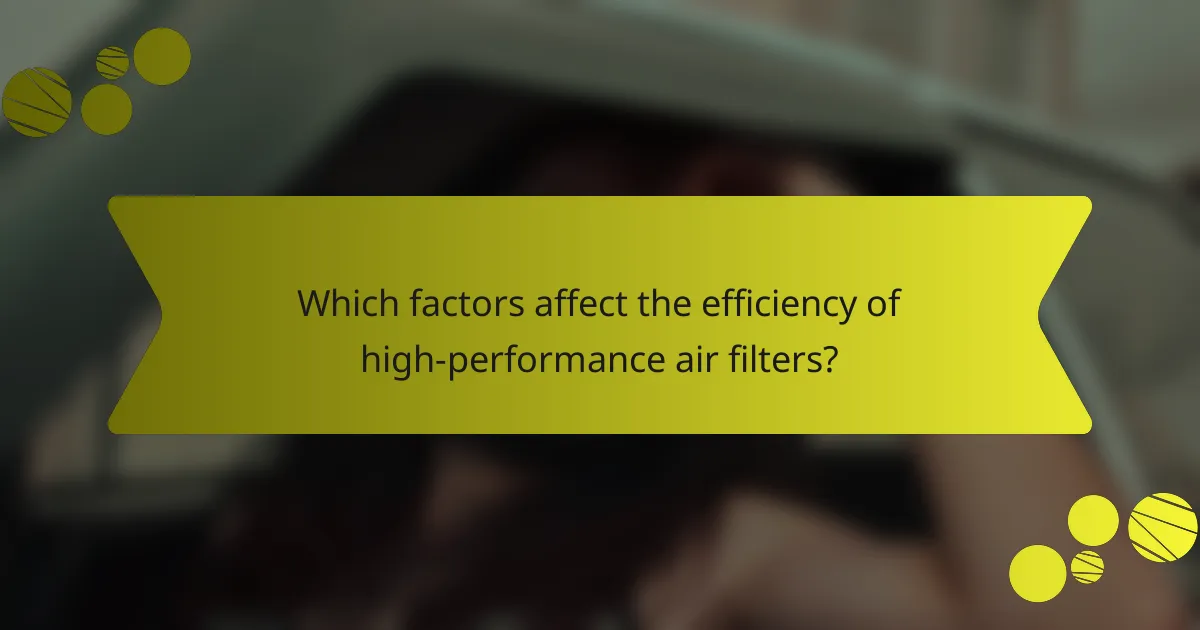
Which factors affect the efficiency of high-performance air filters?
Several factors affect the efficiency of high-performance air filters, including filter material, design, airflow resistance, and maintenance frequency. High-quality materials, like HEPA, enhance particle capture. Efficient design maximizes surface area while minimizing airflow resistance. Regular maintenance, such as timely replacements, ensures optimal performance.
How does filter material influence performance?
Filter material significantly impacts the performance of high-performance air filters by determining their efficiency in trapping particles. The type of filter media, such as HEPA or electrostatic, influences airflow resistance and filtration capability. For instance, HEPA filters can capture 99.97% of particles, enhancing indoor air quality. Additionally, the thickness and density of the filter material affect its lifespan and maintenance needs, with denser materials typically requiring less frequent replacement. Choosing the right filter material ensures optimal performance, balancing efficiency with airflow and longevity.
What role does filter size play in effectiveness?
Filter size significantly impacts the effectiveness of high-performance air filters. Larger filters typically capture more particles and enhance airflow, leading to better overall efficiency. In contrast, smaller filters may require more frequent replacements and can restrict airflow, reducing their effectiveness. For optimal performance, selecting the right filter size is crucial for maintaining air quality and system longevity.
How does airflow impact filter efficiency?
Airflow significantly impacts filter efficiency by determining how effectively air passes through the filter material. High airflow can enhance filtration performance, but excessive airflow may lead to reduced filtration efficiency and increased pressure drop. This balance is crucial for maintaining optimal indoor air quality and prolonging filter lifespan. Proper installation and regular maintenance can help achieve the ideal airflow for high-performance air filters.

What are the best practices for installing high-performance air filters?
To install high-performance air filters effectively, follow these best practices. First, ensure the filter fits properly within the designated housing to maximize efficiency. Second, clean the surrounding area before installation to prevent dirt from entering the system. Third, check the airflow direction indicated on the filter and align it correctly. Finally, schedule regular maintenance checks to replace filters as needed, typically every 3 to 6 months, depending on usage and environmental factors.
How can proper installation enhance filter effectiveness?
Proper installation significantly enhances filter effectiveness by ensuring optimal airflow and trapping efficiency. When air filters are correctly positioned, they minimize bypass air, which can carry pollutants. Proper sealing around the filter prevents unfiltered air from entering the system, enhancing overall air quality. Regular checks and adjustments during installation can further maintain peak performance, ensuring filters operate within their designed specifications.
What tools are needed for installation?
To install high-performance air filters, you need basic tools such as screwdrivers, pliers, and a utility knife. Additionally, a vacuum cleaner is useful for cleaning the area before installation. Depending on the specific filter type, you may also require a ladder or drill for proper placement.
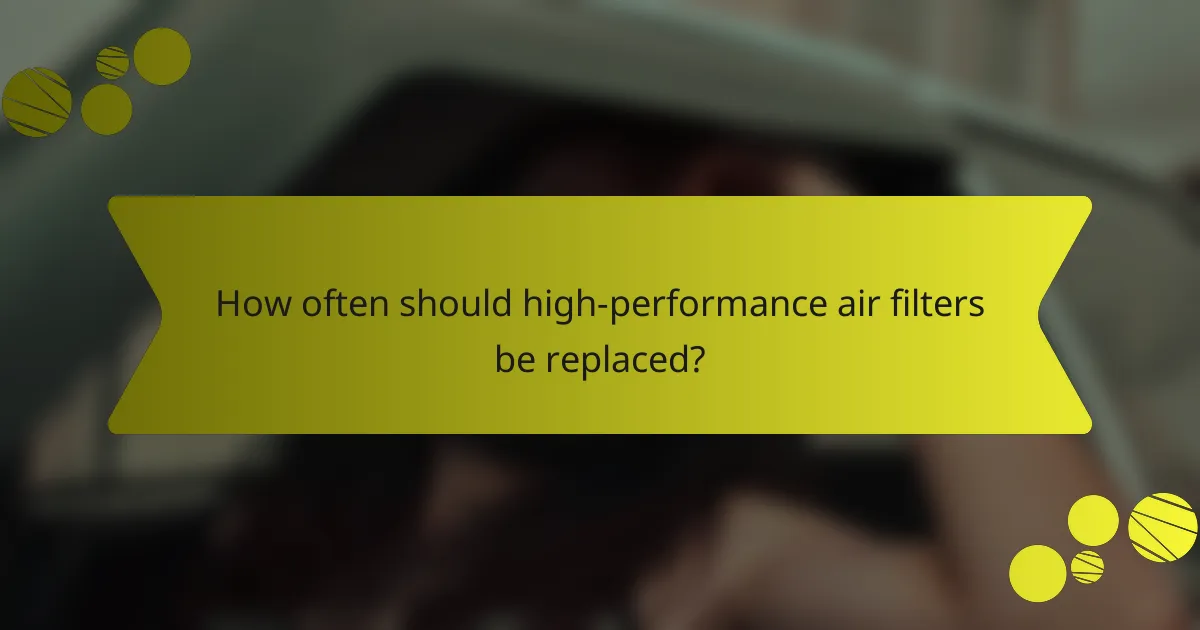
How often should high-performance air filters be replaced?
High-performance air filters should be replaced every 6 to 12 months, depending on usage and environmental factors. Regular replacement ensures optimal efficiency and air quality. Filters in high-pollution areas or homes with pets may need more frequent changes. Check manufacturer recommendations for specific guidelines.
What signs indicate it’s time for a filter change?
Signs indicating it’s time for a filter change include reduced airflow, increased energy bills, and visible dirt accumulation. Regular inspection is crucial for maintaining air quality and efficiency. A filter typically needs replacement every 3 to 6 months, depending on usage and environmental factors. Monitoring these signs ensures optimal performance of high-performance air filters.
How do environmental factors influence replacement frequency?
Environmental factors significantly influence replacement frequency of high-performance air filters. Factors such as air quality, humidity, and particulate matter levels dictate how often filters need changing. For instance, in areas with high pollution, filters may require more frequent replacements to maintain efficiency. Humidity can also affect filter lifespan; excessive moisture can lead to mold growth, necessitating earlier replacement. Regular monitoring of these factors ensures optimal air quality and filter performance.
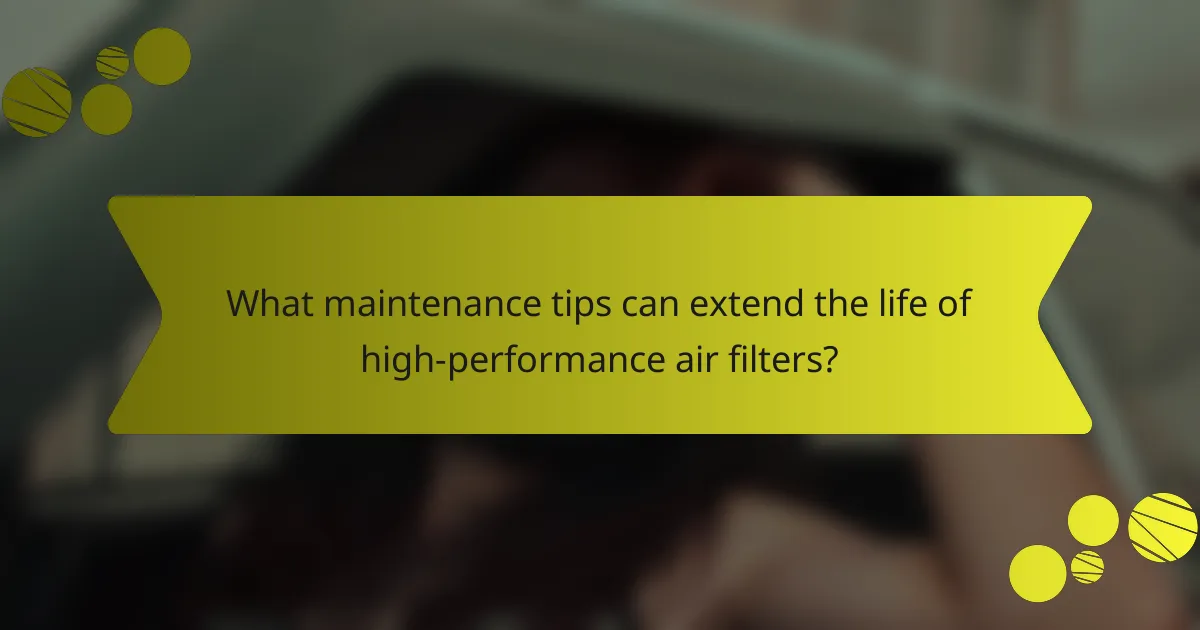
What maintenance tips can extend the life of high-performance air filters?
Regular maintenance can significantly extend the life of high-performance air filters. Clean or replace filters according to the manufacturer’s recommendations, typically every 6 to 12 months. Inspect filters monthly for dirt accumulation and ensure proper installation to avoid air leaks. Use a vacuum or compressed air to remove dust and debris, enhancing airflow efficiency. Additionally, maintain the surrounding area to minimize contaminants entering the filter.
How should filters be cleaned and maintained?
High-performance air filters should be cleaned regularly to maintain efficiency. Start by removing the filter from its housing. Use a vacuum to eliminate dust and debris. For deeper cleaning, rinse the filter with water and let it dry completely before reinstalling. Check the manufacturer’s guidelines for specific maintenance intervals and cleaning methods. Regular maintenance enhances air quality and prolongs filter lifespan.
What common mistakes should be avoided during maintenance?
To maintain high-performance air filters effectively, avoid these common mistakes: neglecting regular cleaning, using incorrect installation techniques, failing to check for leaks, and overlooking manufacturer guidelines. Each of these errors can significantly reduce filter efficiency and lifespan. Regular maintenance ensures optimal air quality and system performance.
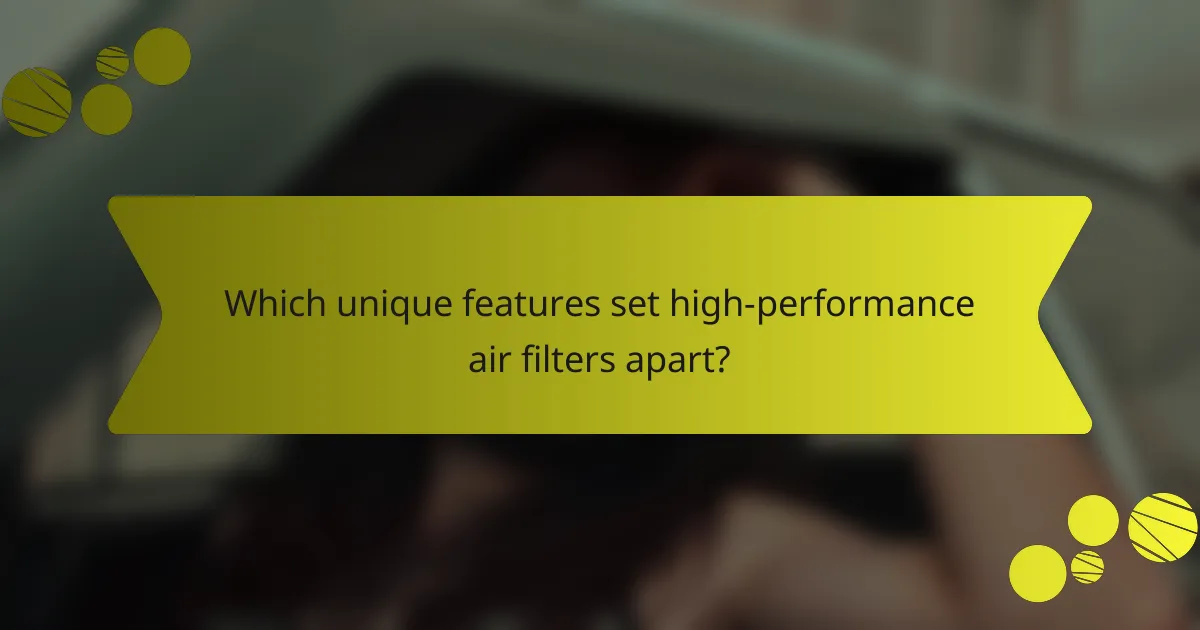
Which unique features set high-performance air filters apart?
High-performance air filters stand out due to their superior filtration efficiency, longer lifespan, and advanced materials. These filters can capture smaller particles, improving indoor air quality significantly. Their unique features include HEPA certification, activated carbon layers for odor removal, and low airflow resistance, which enhances overall system performance. Additionally, many high-performance filters are designed for easy installation and maintenance, ensuring user convenience.
What advanced technologies are utilized in high-performance air filters?
High-performance air filters utilize advanced technologies such as HEPA filtration, activated carbon, and electrostatic precipitation. HEPA filters capture 99.97% of particles, enhancing indoor air quality. Activated carbon removes odors and volatile organic compounds, while electrostatic filters attract and trap smaller particles through static electricity. These technologies ensure maximum efficiency and longevity of air filters.
How do smart air filters integrate with home automation systems?
Smart air filters seamlessly integrate with home automation systems by connecting via Wi-Fi or Zigbee protocols. This allows users to monitor air quality and filter status remotely through apps. Integration enhances efficiency by enabling automated adjustments based on real-time data, ensuring optimal performance. Additionally, smart filters can send alerts for maintenance needs, promoting proactive upkeep and improved air quality.
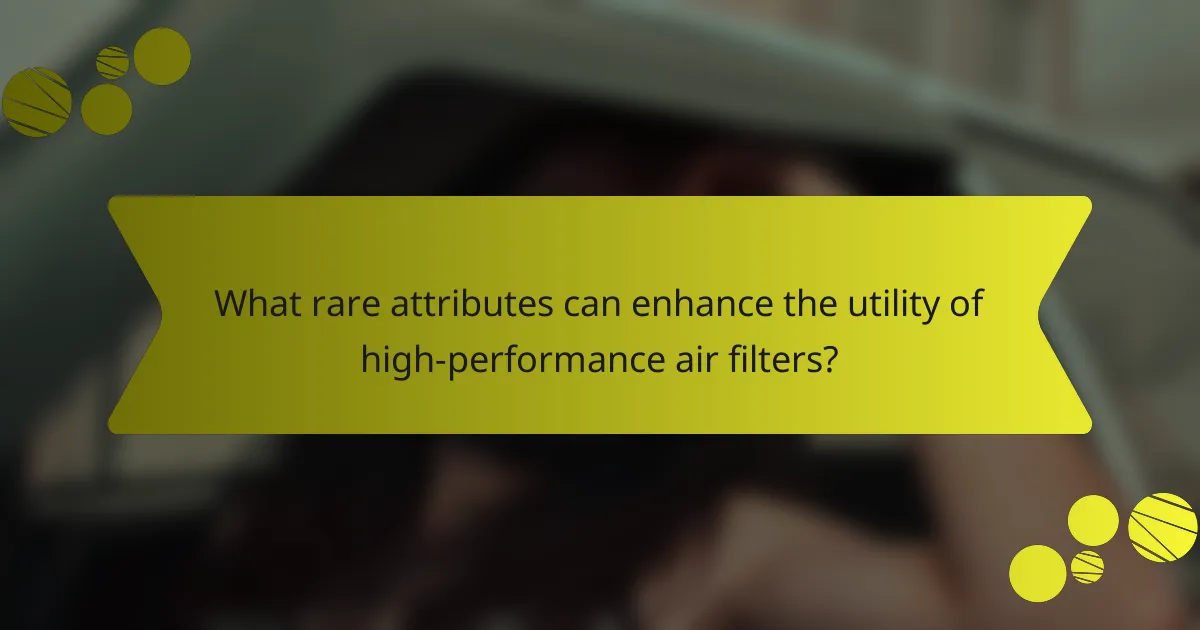
What rare attributes can enhance the utility of high-performance air filters?
Rare attributes that can enhance the utility of high-performance air filters include advanced filtration technologies, smart sensors for real-time monitoring, and self-cleaning capabilities. These features improve air quality, efficiency, and maintenance ease. For instance, filters with electrostatic properties can capture smaller particles, while smart sensors provide data on filter status and air quality levels, ensuring optimal performance. Additionally, self-cleaning filters reduce maintenance frequency, making them more convenient for users.
How do specialized filters target specific pollutants?
Specialized filters effectively target specific pollutants by utilizing advanced materials and designs tailored for particular contaminants. These filters can capture allergens, smoke, and volatile organic compounds through electrostatic attraction or mechanical filtration. For instance, HEPA filters excel at trapping particulate matter, while activated carbon filters neutralize odors and chemical vapors. The efficiency of these filters often depends on their MERV rating, with higher ratings indicating better pollutant removal. Regular maintenance, including timely replacement, enhances their performance and lifespan.
What innovations are emerging in air filter technology?
Emerging innovations in air filter technology focus on enhanced efficiency, smart features, and eco-friendly materials. New filters utilize advanced filtration media, such as HEPA and activated carbon, to capture smaller particles and odors. Smart air filters now integrate IoT technology, enabling real-time monitoring and performance analytics. Additionally, biodegradable materials are being explored to reduce environmental impact. These advancements improve air quality while simplifying maintenance and installation processes.
What are the environmental impacts of high-performance air filters?
High-performance air filters can significantly reduce environmental impacts by improving indoor air quality and reducing energy consumption. They capture pollutants more effectively, leading to cleaner air and lower emissions from heating and cooling systems. Additionally, they often have longer lifespans, which reduces waste. The use of high-efficiency filters can result in lower greenhouse gas emissions by enhancing HVAC system efficiency.
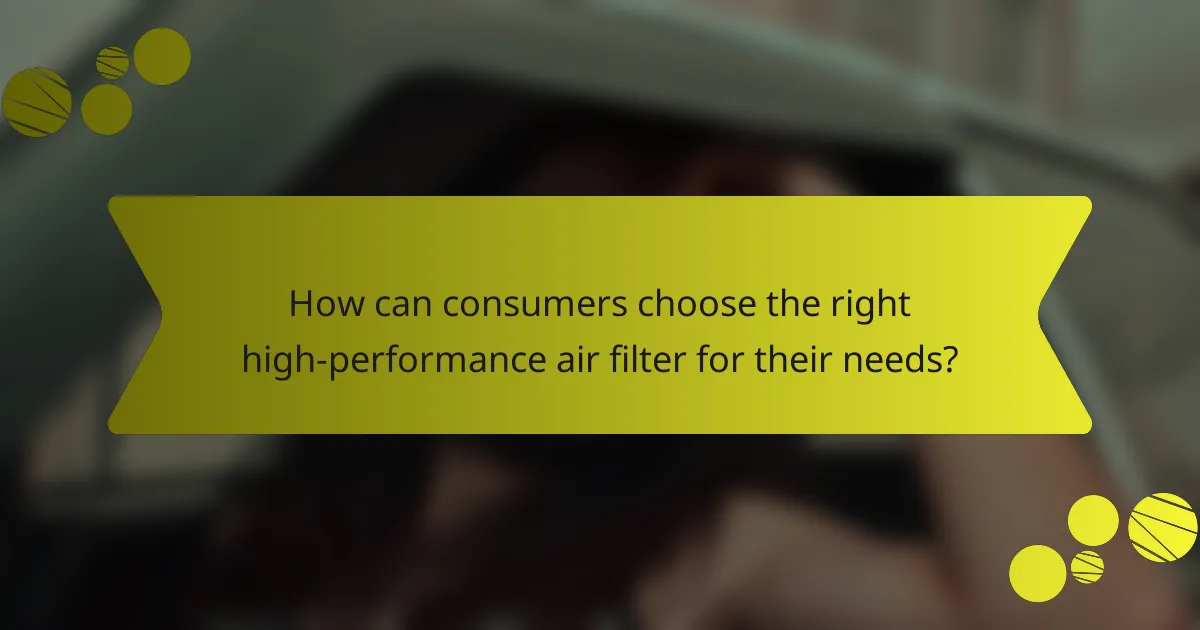
How can consumers choose the right high-performance air filter for their needs?
Consumers can choose the right high-performance air filter by assessing their specific needs, filter efficiency ratings, and maintenance requirements. First, identify the intended use, such as residential or commercial applications. Next, consider the filter’s MERV rating, which indicates its ability to capture particles; higher ratings mean better filtration. Installation type matters too; some filters are designed for easy DIY installation, while others may require professional help. Lastly, evaluate maintenance needs, including how often the filter should be replaced or cleaned to ensure optimal performance.
What factors should be considered when selecting a filter?
When selecting a high-performance air filter, consider efficiency, installation ease, and maintenance requirements. Efficiency ratings indicate how well the filter captures pollutants. Installation should be straightforward to encourage regular replacement. Lastly, maintenance frequency affects long-term performance and cost.
Which brands are recognized for quality in high-performance air filters?
Brands recognized for quality in high-performance air filters include K&N, Airaid, and Fram. These brands excel in filtration efficiency, durability, and ease of installation. K&N filters are known for their reusable design and high airflow, while Airaid offers advanced filtration technology for enhanced performance. Fram is recognized for its affordability and reliability, making it a popular choice among consumers.
What expert tips can help maximize filter selection and use?
To maximize filter selection and use, consider the following expert tips. Choose high-performance air filters that match your system’s specifications for optimal efficiency. Regularly check and replace filters based on usage and environmental conditions. Ensure proper installation to prevent air leaks, which can reduce effectiveness. Lastly, maintain a cleaning schedule to prolong filter life and maintain air quality.
